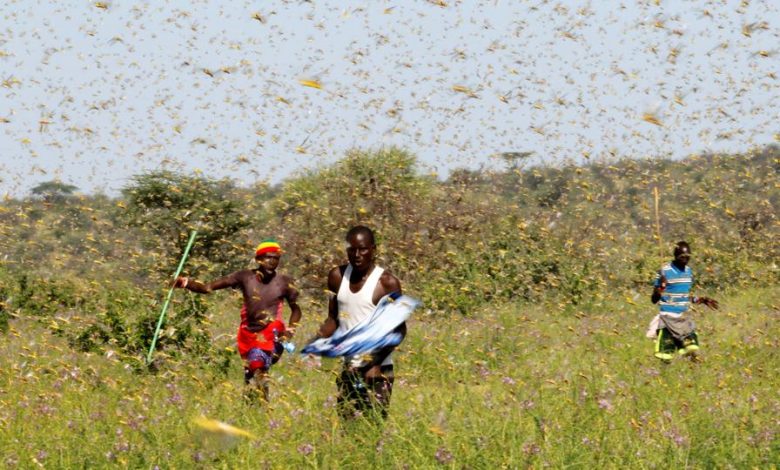East Africa Is Expecting Another Locust Invasion

According to the UN Food and Agriculture Organisation (FAO), a new generation of immature swarms of desert locust have now started to form in northwest Kenya.
“swarms will remain for a short time during which there is a considerable threat to crops and pastures in Turkana and Marsabit counties. From about 15 June, an increasing number of swarms are expected to migrate northwards with the prevailing winds to Ethiopia and Sudan”.
In Ethiopia, the FOA states that the swarms are likely to first appear in the south and continue to Oromia, Somali, Amhara, Afar and Tigray regions.
FOA adds that “It will take about one week for swarms to migrate from northwest Kenya to Sudan. During that time, they will traverse South Sudan (mainly east of Juba, Bor, and Malakal) and perhaps northeast Uganda, before reaching the extreme southern summer breeding areas of Sudan (South Kordofan, West Kordofan, East Darfur, South Darfur, White Nile, Blue Nile)”.
“From there, some swarms may continue to North Kordofan, North Darfur, and perhaps West Darfur. Other swarms may appear in states adjacent to Ethiopia”.
“If swarms reach Sudan and find dry conditions, then they are likely to migrate to eastern Chad and continue westwards across the Sahel of West Africa”.
The frontline countries in the sub-region most exposed to the threat – Burkina Faso, Chad, Mali, Mauritania, Niger and Senegal are already facing the impact of the novel coronavirus disease 2019
Since February 2020, hundreds of millions of desert locust swarms have flown from Africa to India and have destroyed hundreds of thousands of hectares of arable land.
In May, The Director-General of the Food and Agriculture Organization of the United Nations (FAO), Qu Dongyu, warned that efforts to control Desert Locusts will take time, noting increased concern for the Sahel and Southwest Asia is adding to the burden of efforts ongoing in the Horn of Africa and Yemen.
Support Our Journalism
There are millions of ordinary people affected by conflict in Africa whose stories are missing in the mainstream media. HumAngle is determined to tell those challenging and under-reported stories, hoping that the people impacted by these conflicts will find the safety and security they deserve.
To ensure that we continue to provide public service coverage, we have a small favour to ask you. We want you to be part of our journalistic endeavour by contributing a token to us.
Your donation will further promote a robust, free, and independent media.
Donate HereStay Closer To The Stories That Matter




